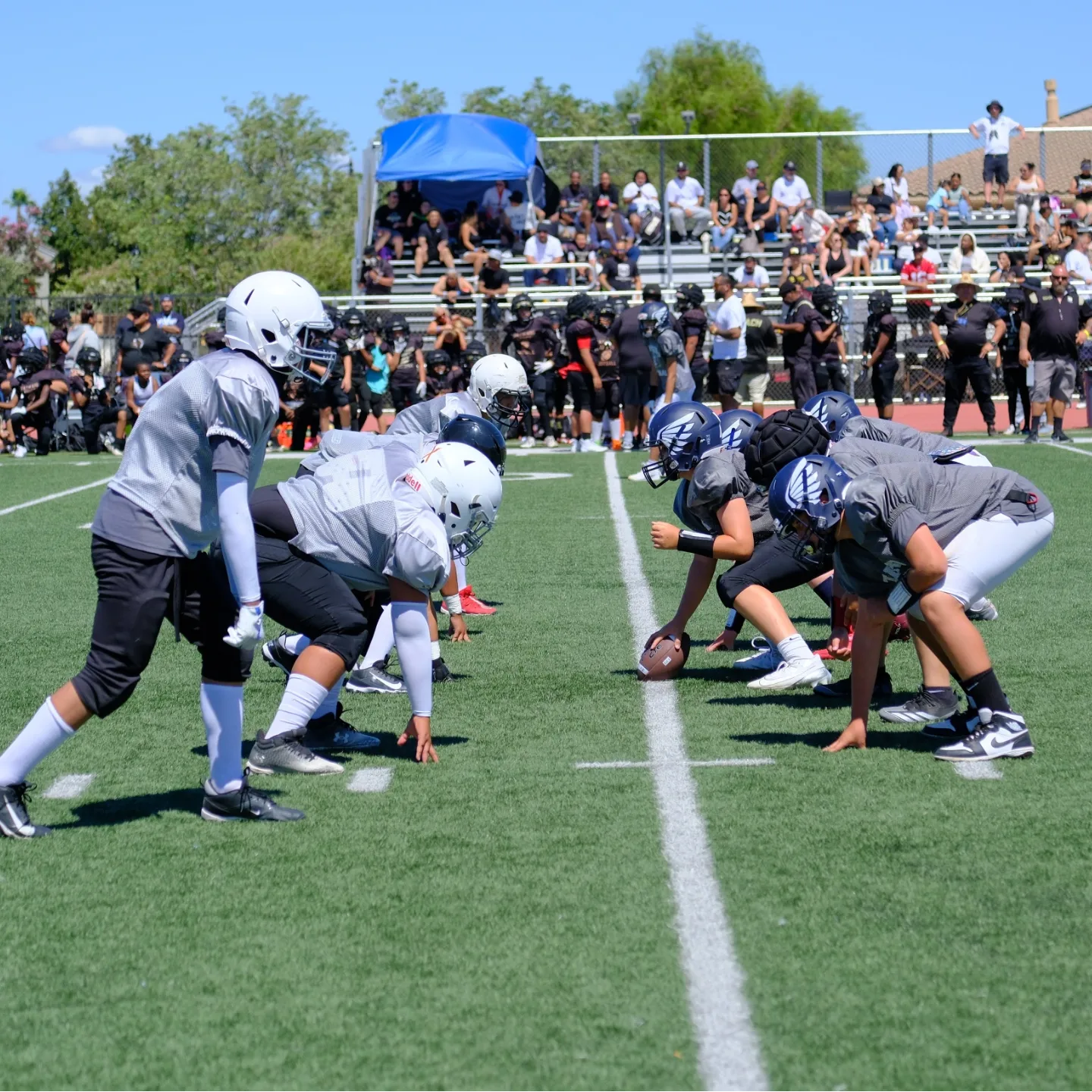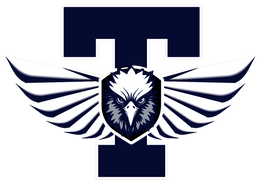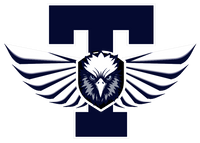Program Info
This starter guide is meant to help families better thrive in the East Bay Youth Football & Cheer (EBYFC) Association. EBYFC is the parent organization which our San Ramon Valley Thunderbirds League is a part of. The intent is to provide a reference guide to the league’s workings, understand how our T-Bird coaches structure positive practices, and provide a sneak peak for what to expect at T-Birds. Our goal is to have all teams in the playoffs and winning a Turkey Bowl in 2026. Fly High! 🦅
See the notable 2026 EBYFC Rule Changes for this coming season.
Tap here to view the 2025 EBYFC Rulebook (will be updated).
Athlete Safety
Read our full T-Bird Athlete Safety Guidelines and Procedures. This contains information about Guardian Caps for all Football athletes, Concussion protocols, and Return to Play procedures.
Video Vault
Want to get fired up for the T-Birds Season? Check out our Video Vault or our Instagram Highlight Reels!

EBYFC Football & Cheer Locations
EBYFC Football & Cheer City Map - Team Legend
• BACR Bengals (Albany) • Clayton Valley Jr. Eagles (Clayton) • Concord Jaguars (Concord) • East County Lions (Brentwood) • Fremont Firebirds (Fremont) • Hayward Aggies (Hayward) • Livermore Bulls (Livermore) • Martinez Bulldogs (Martinez) • Milpitas Knights (Milpitas) • Mountain House Stallions (Mountain House) • NorCal Wolverines (Antioch) • Oakley Jr. Falcons (Oakley) • Pleasant Hill Falcons (Pleasant Hill) • Pleasanton Hawks (Pleasanton) • Rodriguez Jr. Mustangs (Fairfield) • San Jose PAL Blitz (San Jose) • San Leandro Crusaders (San Leandro) • San Ramon Bears (San Ramon) • San Ramon Valley Thunderbirds (Danville) • Supreme Team (Antioch) • Tri-City Dolphins (Pinole)

Division I Football
EBYFC’s league for competitive teams. Division I teams practice separately, have different game schedules, and cap out around 30 players (min. 15 players are required to play the game).
Glossary
- Minimum Play Record (MPR): The minimum number of plays required for each player to complete prior to the end of regulation (4th quarter) in each game. MPRs ensure all players get a minimum number of plays each game.
- Older/Lighter: Older/Lighter players are players who are a league age year older than regular players. They are allowed to play down a division if their weight falls within the weight limit of the Age/Weight Table in the EBYFC Rule Book. Older/Lighter players are NOT allowed to advance in age during the season.
- Jamboree: A one-day event in mid-August where teams across the EBYFC Association compete in a rapid-fire scrimmage. This occurs usually one week before the start of the season.
- Turkey Bowl 🦃: The EBYFC championship game in November. The Granddaddy of Them All!
Coaching Principles
- Positive and Motivated: Ensure every player is motivated to come back each day.
- Coach to the player: Help these young players develop into the best versions of themselves.
- Build community: Creating engaged communication, transparency, and trust with parents is mission critical to player and team success.
- Aim for Excellence, but have fun: We aim high with player development, but make it fun.

Division II Football
EBYFC’s league for secondary teams. This includes former 'Champion' or ‘Development’ teams fielded in previous years. Min. team size of 16 (min. 15 players are required to play the game).
Week 1: Bringing Structure
During the first full week of practice, players will be in helmets, practice jerseys, shorts, and cleats. They are required to wear mouthpieces. There is zero contact allowed, with a primary focus on skills and conditioning. All players must complete a minimum of 10 hours of practice in helmets before being certified for full pads in Week 2.
Practices start at 6pm sharp. Most players arrive between 5:15pm - 6:00pm. This is the time when coaches communicate practice agenda with other coaches and arrive to get stations set up. A majority of players are dropped off, so they are our responsibility the moment they step on the T-Birds practice field.
The first week of practice can be busy. There are typically several hundred kids combined across J-PW, PW, JV, and Varsity. Helmets sometimes don’t fit, kids forget items. The most commonly lost items are mouthpieces. The Equipment shed has a ton of these. All blocking pads & equipment are stored in the T-Birds Equipment shed on the Monte Vista Practice field. The teams are split between the Monte Vista Practice field and the Los Cerros Middle School fields. Each level (e.g., PW) has a dedicated practice field. Bigger teams like JV may occupy several practice fields. As a coach, it is our responsibility to retrieve and return equipment to the shed each day. T-Bird teams spend the first half of practices focused on ~4-6 position stations, rotating between offense skill and defense skill days.
During these practices, coaches focus on:
- Bringing order to the chaos.
- Teaching players a rhythm of repetition (e.g., calisthenics, practice cadences).
- Demonstrating skills and conditioning.
- Evaluating skill level for Division I and Division II teams.
The second half of practice typically focuses on building discipline (“Yes, Coach”; “No, Coach”), teaching game fundamentals, establishing playbooks, and exercising game rhythm.

Where you can help
As an interested parent volunteer or coach, the best thing you can do is shadow existing coaches at their respective skill stations. No preparation is needed. Ask where you can lend a hand. A pro-tip is that the players should always be moving. If there are more than 10 players per station, that leads to down time for kids at the back of the line. Down time equals wasted time. The smaller the groups, the better. The more coach volunteers to help wrangle skill stations, the better. After skill sessions (~20-30 minutes), we usually give players ~5 minutes to grab water. We keep water breaks as short as possible while we set up the next activity.
Weeks 2 - 3: Forming Division II Teams
As a coach, we will likely not know our final roster for ~2-3 weeks. This is because every player is getting evaluated for Division I team readiness. As coaches, it’s our responsibility to create a positive experience during these first three weeks to motivate players to grow with T-Birds.
The first week of pads will be challenging for first-time players. In Week 2, what seemed like an easy extension of Flag Football will slow speedy players and level the playing field. Full contact changes player attitudes, confidence, and motivation.
Football is an impact sport. Jr. Pee Wee and Pee Wee levels are slower-moving in terms of velocity impact. JV and Varsity levels move significantly faster in terms of game speed and player physical maturity. Injuries happen and are a part of the game. For all levels, Weeks 2-3 spend a majority of time on taking contact, form tackling, and how to protect themselves. T-Bird players will start from tackling bags on their knees, to stationary tackling on their feet, to tackling while moving, to repeating that crawl, walk, and run tackling process on another teammate.

Weeks 3 - 4: First Weeks of Division II
For new coaches, we typically have them shadow for the first three weeks, so they are well-positioned to dive into the first full week with their teams. This will help build a relationship with each T-Bird player coming to Division II teams. Around the end of Week 2 - Week 3, all Division II teams will move to the Los Cerros Middle School fields for the start of Division II practice. Division I teams will stay on the Monte Vista Practice fields.
Soccer and baseball teams often occupy these Los Cerros fields prior to 6pm, hence the stress on every practice minute matters. We have a wide range of coaches volunteering at the Division II level. Coaches might be coming from a coaching Flag Football, where another coach might have 10 years of tackle experience. Another coach might have no experience, or a dad who played high school football just looking to volunteer one day a week. The key commonality is that tackle football is a commitment for all coaches, regardless of experience. We take that seriously for the success of your young athletes.
Volunteers
Game volunteers are the most essential roles in the T-Birds. T-Birds requires 12 volunteer hours throughout the season by parents. This is how we are able to operate. As coaches, we aim to lock these down as soon as possible for the season, often in the first week with our teams.

Weeks 4 - 6: Bringing it together
We will have roughly three weeks of five days a week practices from the time of Division I and Division II teams forming (late July) to the league-wide Jamboree (mid-August). We use our first week of breakout practice to create variations which keep skill stations fresh for the players. Skill station repetition is important, but variation is even more important to ensure cadences don’t get stale. When looking for inspiration, we lean on USA Football drills. Thoughtfully planning these drills ahead of practices help our T-Bird coaches create a successful cadence of engaging skill stations.
Jamboree
The Jamboree is a rapid-fire scrimmage over two hours. Division I and Division II teams will have separate Jamborees. Each T-Birds team will play three 20-minute mini-games. Each side gets 8 minutes of running clock offense, a 4-minute break, and 8 minutes of running clock defense. There are no timeouts and no Special Teams (punts, kickoffs, returns) at the Jamboree.
The intent is to get as many plays in as possible. In past Jamborees, teams typically executed between 8-12 plays on offense, depending on play-calling speed. All teams will wear their practice jerseys (no game jerseys). This is a perfect opportunity to practice play calling through wristbands.
Week 6: Game Week (Three days a week practices)
The week after the Jamboree, we will switch to three practices per week (Tue/Wed/Thu) leading up to your first game. This means that we will have a condensed practice schedule. In past seasons, we emphasized Offense on two days per week and Defense one day per week. We still incorporate tackling into our Offense days, but at a lower velocity.
Game Days (Saturdays or Sundays)
Schedules
Game times, schedules, and locations can be the most unpredictable part of your T-Birds journey. Coaches will be given an initial season schedule in early-to-mid-August. We typically set early expectations with parents that schedules can and will change. This is primarily due to changes with securing EBYFC field locations across the East Bay Area.
Coaches typically instruct parents to arrive two hours early to every game kick-off. For a 9am game, this means that all players should arrive by 7am. This also allows a buffer for players getting caught in traffic and or waking up late. Every T-Birds Head Coach is responsible for weighing in the opposing team’s roster ahead of each game. Each Coach carries a binder with EBYFC-certified player cards from week-to-week. These cards are each player’s ‘pass’ to play each week.
Warm-ups
Once our players are dressed, we typically aim for 45 minutes on the field with a pre-game warm-up. This heavily depends on the game time and whether there is another prior game happening on the same field. We don't underestimate how long it takes our Teams to get dressed. As Coaches, we’ve had kids forget integrated pad pants, helmets, jerseys, shoulder pads, mouthpieces, and more. So, the more time to prepare and warm up pre-game, the better.
Game Format
Games are four 10-minute quarters. All EBYFC Division I and Division II teams use a Minimum Play Requirement Format (MPR). This means the minimum number of plays a player must play (as counted by pre-designated parent volunteers) before the completion of the fourth quarter. Division I and Division II MPRs are based on team sizes (i.e. a team size of 15 to 23 players may require a minimum of 12 total plays per player per game). If a team does not meet these requirements by the end of the fourth quarter, the other team wins by default. This is a foundational EBYFC rule to encourage fair play and develop young athletes equitably. MPR play count rules are reviewed ahead of the season with all coaches.
Want to Learn More?
Made it this far and interested in volunteering, coaching, or just learning more about how you can help the T-Birds organization thrive even more? We would love to hear from you!
Email: srvtbirds@gmail.com








